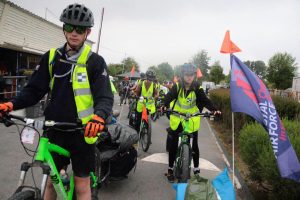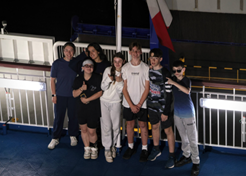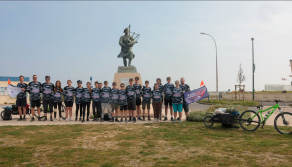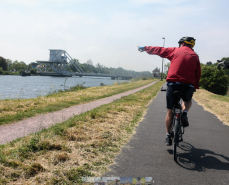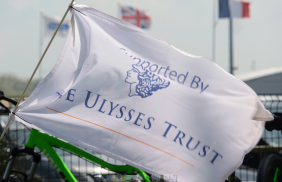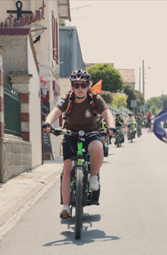18 Cadets and 5 Cadet Force Adult Volunteers travelled from Tunbridge Wells to take part in an overseas bike expedition along the beaches of Normandy, France.
Many training evenings took place to help the cadets gain experience and confidence when using the trailers attached to the bikes and for each cadet to be sized up to their individual bikes. A practice with the trailers took place one Saturday morning at Bedgebury National Pinetum and Forest to allow the cadets to get used to long distances with the trailers.
As the day of departure grew closer, cadets were sorted into pairs in which they were to share the trailer and tents with and to prepare a presentation on a chosen beach that we would soon to be riding along based on the history and importance the location.
For many cadets, this was their first cadet event/ camp due to being new in the organization so the excitement was high for this unique and new experience.
On the Thursday evening, Cadets arrived at 129 Tunbridge Wells Air Cadet Squadron with their last bits of kit, as the trailers had been packed previously in the week, all prepared and ready to set off. We travelled down to Portsmouth and parked our minibus and car inside HM Naval Base Portsmouth. We unloaded all bikes and trailers and made sure we had everything we required. After the long journey from Tunbridge Wells, anticipation was growing, and the cadet’s level of excitement was high. We set off to cycle 5 minutes from the base to the ferry port, we cycled onto the overnight ferry and set up in our cabin for the night. We made our way up to the top deck and watched our departure out of the port at 11pm, looking forward to the adventure awaiting us.
Day One
After a long night and a change in time zone on the ferry, we cycled off the other side of the ferry with all our kit into Cherbourg where the journey began at 8am on Friday morning. We rode through Utah and Ohama beaches along the Normandy coast where the cadets were able to reflect on the history of the American D-Day landings, 79 years ago.
We stopped around 1pm for lunch which cadets had bought from home and luckily the sun was still shining, and spirits were high.
After a total of 85k, we arrived at our campsite in Point Du Hoc where in our pairs we began to set up our tents for the night. We set up our Trangia stoves to get cooking our MOD ration packs for dinner and prepared ourselves for the following journey the next day.
“Really great way to get to know people speaking as a newbie within cadets, and it was a great way to build character as it really helped us all discover what we were really made of.”
Cadet Scarlet Dale
Day Two
Today started with a 7am rise to get cooking our ration pack breakfast ASAP. Many cadets rolled out of their tents with sore legs from the previous day, but with the positivity around the campsite, we were all eager to get started on the day ahead. Tents were packed down; rubbish was cleared, and our kit was tightly packed away ready to go into the bike trailers, ready for the journey ahead.
We all set off at 8:30am from Point du Hoc to begin our ride for the day. We travelled through Gold beach, one of Britain’s D-Day landing sites, followed by Juno Beach, Canadas only landing site on the Normandy beaches.
A further 83 kilometers along the Normandy beaches was extremely challenging and left us all very tired but we all pushed through, and every member of the team showed great resilience in doing so. Before we set up camp for the last night, we headed down the road from the campsite where the cadets were surprised by the staff by getting food from a small restaurant, where we got burgers and hot dogs instead of ration packs! After a long tough day, this was a perfect way to boost morale and relax.
“One of the best experiences cadets has ever provided, this opportunity was one in a lifetime, and I would love to without a doubt do it again. The support from staff and the morale was spectacular and I am very appreciative of this.”
Corporal Kian Hepden
Day Three
We packed our kit and checked out of our campsite for 8am, ready to set off on our final journey of our last day of this adventure of Normandy. We rode along the Sword beach paths for 23km which was a lovely scenic route, with the ferry port in sight. We reached our destination, Ouistreham ferry port, at around 2pm on Sunday. Our journey had come to an end but the memories it has provided us with will be lifelong.
When we reached our final destination, most of us parked up our bikes for lunch and relaxed, waiting for the time to queue up and wait to board our return ferry home. However, Cpl James Reeve powered on and continued cycling to Pegasus bridge, supported by 3 staff members; Flt Lt Vousden, WO Myhill and FS Atherton, as they cycled another 15km:
“We were averaging 26km/hr. most of the way which was good to hear. We cycled along the river where the gliders would have used to navigate and as we got closer to the bridge you could start to see the little dips where the bunkers were made as defensive positions. We then had a little stop at a café while we were there which was full of war badges and medals from the D-Day conflicts along with many from other conflicts. We then moved to look at the original bridge which is placed behind the museum however you could still see the dents and bulges where the rounds had hit and for me that really had a big impact on me and really made me think about what went on and how much we owe these men and women.”
Corporal James Reeve on his experience to Pegasus Bridge
The weekend was a unique experience, pushing all of us to our limits whilst experiencing the beautiful views of Normandy. We got very lucky with the sun shining over the 3 days of cycling and zero mechanical issues. We travelled with no support vehicle meaning all the cadets showed great determination to get to the finish line. Confidence was slowly gained by every cadet, considering this was the first time away from home for many and an amazing achievement for all. We would like to thank Ulysses Trust for the support for this expedition as it wouldn’t have been possible without it.
The Ulysses Trust also wish to thank the generosity of the Royal Air Force Charitable Trust for supporting this expedition. www.rafct.com

